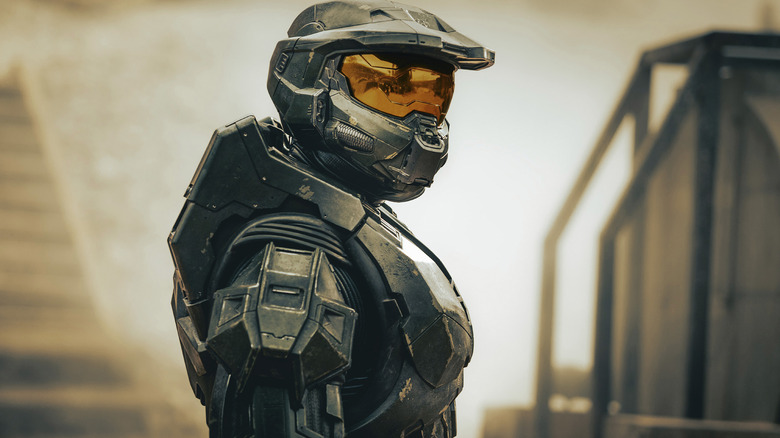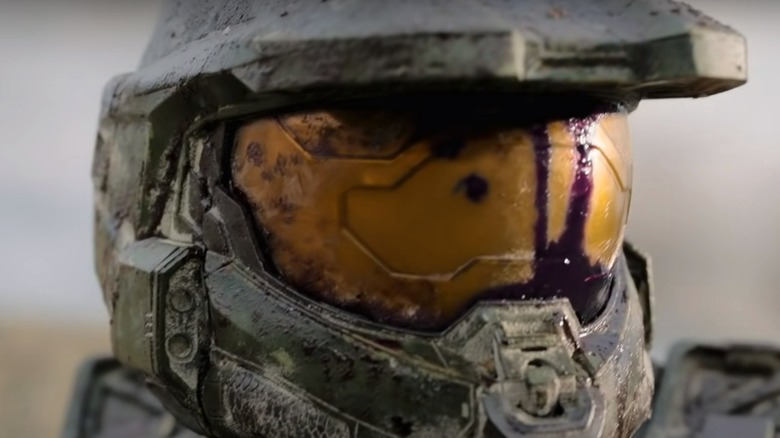Master Chief's Blank Slate Personality Was A Good Thing, Says Halo Showrunner
Whenever any creative team takes on the challenge of adapting a popular and well-known property, it tends to be a tricky balancing act between lovingly translating all the familiar elements that fans have come to expect ... and changing up certain aspects that simply wouldn't work in another medium. Those difficulties feel even more magnified when it comes to video game adaptations, which arguably require the most amount of finessing to account for that fact that there's, you know, a fundamental difference between gamers playing a first-person shooter and viewers watching a traditional narrative unfold in front of them on the big (or small!) screen.
By their own admission, that fact posed quite a challenge to the team behind "Halo," the new Paramount+ series that will finally attempt to give the Master Chief the live-action treatment that fans have clamored for ever since the early 2000s. But there's always been this one pesky, nagging little fly in the ointment that writers were going to have to address sooner or later: the fact that the Master Chief himself, ostensibly the main character of the entire franchise, is largely a blank slate for any gamer to project themselves onto. It should probably go without saying how that has a tendency to be a deal-breaker when it comes to getting viewers invested in a movie or series adaptation.
In a lengthy report by Variety, season 1 showrunner Steven Kane addressed this very issue. In his own words, "[The Master Chief is] everybody, right? He's you, he's me, he's a 6-year-old girl, he's a 15-year-old person in a different country. Whoever plays the game is him." Such universal appeal behind a faceless hero is an undeniable strength for any story, regardless of medium (see: Spider-Man), though the lack of a distinct personality still presented a hurdle to be overcome. As it turns out, the writers of "Halo" decided to solve this thorny problem almost paradoxically — by leaning into that quality as much as they could.
'A story about a man discovering his own humanity'
So how do you get around the fact that audiences need to have some sort of connection with the main character? Well, one solution involves the Master Chief actually (gasp!) taking off the helmet that he always wears throughout the games. Another has to do with the show's unique and very different approach to the artificial intelligence Cortana, which will help add even more layers to the show's depiction of John-117. But more than anything else, the problem had to be solved on a script level. According to co-showrunner Kyle Killen, the key was to acknowledge the Master Chief as the blank slate that he was and directly incorporate that into his arc as a character. It's an inescapable fact that, in the first two episodes (which I reviewed here), our main hero is ... kind of a bore. But in future episodes, that apparently will change in a big way. As Kane puts it,
"We're going to tell a story about a man discovering his own humanity. In so doing, he's invited the audience to discover that guy's humanity too."
Showtime co-president of entertainment Gary Levine goes even further, explaining how they arrived at a point where they could genuinely add to our understanding of the world-famous Spartan super-soldier, beyond just pointing him towards enemies and shooting them in the face (although he does his fair share of that, too). "We got the script to the place where we said, 'You know, this is a deep dive into character. What are the costs of turning human beings into killing machines?'"
Will this ultimately pay off with a worthy adaptation of the beloved video games? We'll have to wait and see, but these comments point to as good a starting point as any. "Halo" premieres on Paramount+ on March 24, 2022.

